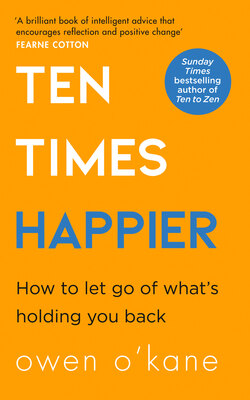Читать книгу Ten Times Happier - Owen O’Kane - Страница 19
CHAPTER 2 GET OUT OF YOUR HEAD
ОглавлениеHave you ever stopped to consider that your mind, and how you relate to it, might play an enormous role in how happy you are? With absolute confidence, I can assure you it does. My mind once sabotaged my happiness on a mindfulness retreat! I’ll explain.
I had always thought of myself as a mindful and pretty chilled kind of guy. That was until I attended a mindfulness teacher-training course.
It was an intensive retreat over nine days, with very early starts and late finishes – often after 10 p.m. Most meals were in silence and large parts of the day were spent practising mindfulness. Set in a beautiful location in the heart of the countryside, it should have been the perfect place for calm. We were privileged to have the inspirational Melanie Fennell (a very respected figure in the world of therapy and mindfulness) as our coach – and her words ‘just notice’ played a huge part in my training. But calm didn’t come easy.
Before the course I had envisaged nine days of peace and tranquillity leading to a blissful state of contentment. But I was wrong. Once I had the space to breathe and find silence, I discovered that my mind didn’t stop.
• If it wasn’t worrying, then it was planning.
• If it wasn’t thinking about the future, then it was replaying the past.
• If it had nothing to do, then it would start wondering what was for dinner or what the other participants were doing.
I thought I was a pretty calm person, but I was astounded to discover I had a mind on overdrive that didn’t quite know how to slow down.
The experience was uncomfortable but an incredible breakthrough. My mind was getting in the way of living and of my happiness. And this realization was swiftly followed by another – that I would now be a lot better at being able to identify with, and help, my clients for whom this was also a problem.
The volume of the noise in my head was astounding. For example, it was day four of the course and I was seated ready for a forty-five-minute guided mindful meditation. The focus was compassion. I had been looking forward to this meditation and had made a decision that it was going to be a perfect, peaceful one.
This was not the case. Even before the meditation started, I was irritated with my position in the room, as it was close to a door. I had planned to arrive on time to get a better seat but I’d been delayed. This started a self-attack in my head: ‘You idiot, why did you arrive so late?’ There wasn’t much compassion happening at this stage!
And it got worse. My next irritation was a person close to me breathing too loudly, followed by a cramp in my leg, and then my tummy started to gurgle louder than it has ever done in my life. The noise in my head got louder, the self-criticism strengthened and suddenly I was telling myself this was all a waste of time. I was deflated, disappointed and by that stage I just wanted to give up on the course. Here I was, a therapist on meditation training, and I couldn’t get the basics right.
When the meditation session had ended, I had an opportunity to discuss the experience with my mentor. I described what happened and to my surprise, she smiled. ‘Wow,’ she said. ‘Sounds like a great meditation.’
I was stunned. What was so great about that? But as she explained, it was a great meditation because I had noticed my mind. I had noticed all of the activity and frustration. But it hadn’t stopped me trying to meditate. It was fine if I noticed all of the activity in my mind – noticing it didn’t mean I had to engage with it. This was one of the most liberating moments of my life. I realized I needed to learn the skill of managing my mind and regulating the volume.
Our minds are at the centre of all our experiences. You are learning the skill of taking back control of your mind, so it doesn’t take control of you.
